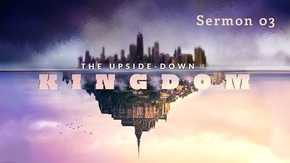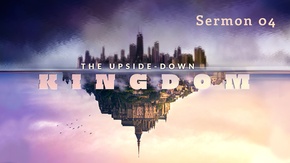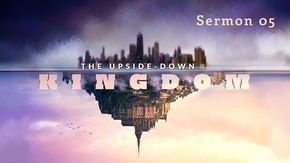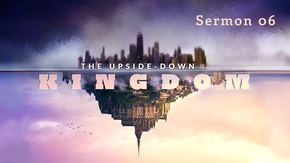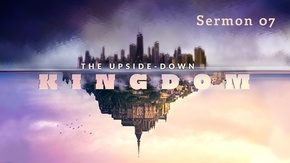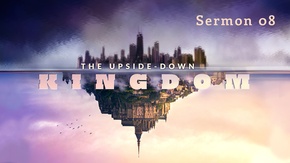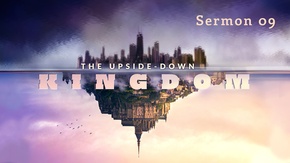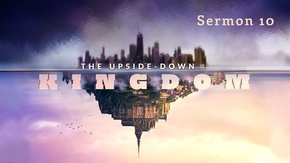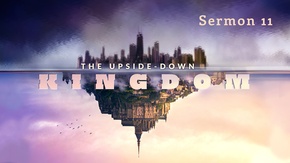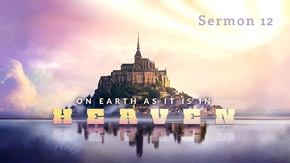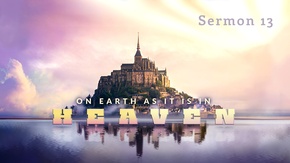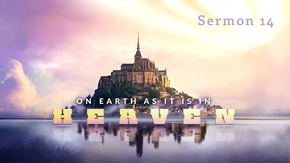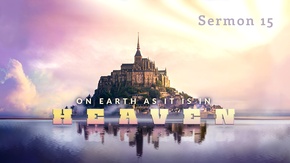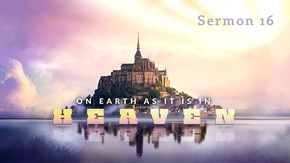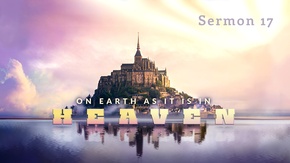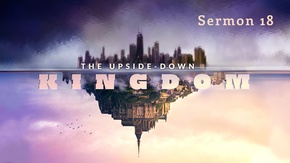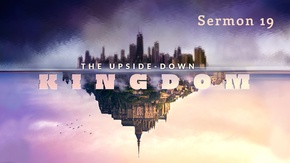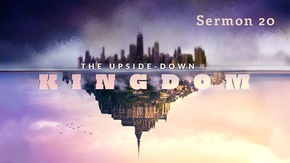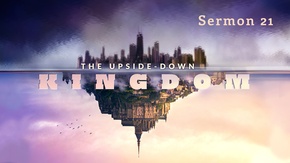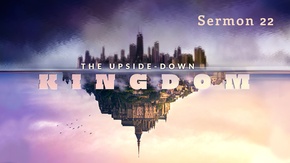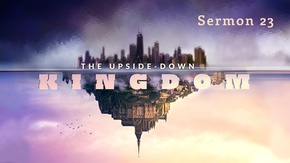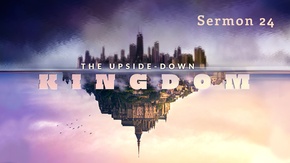For yours is the kingdom and the power
and the glory forever, Amen.
It is a grand crescendo of what has been, for the last few weeks, kind of a sobering prayer, if you think about it. The last three petitions we’ve looked at have been cries for mercy in a dark and battered world:
- Amidst all the scarcity and hunger, give us this day our daily bread.
- Amidst all the sin and bitterness and anger in the world, forgive us our debts as we also have forgiven our debtors.
- And amidst all the dangers, toils, and snares, lead us not into temptation, but deliver us from evil.
These are desperate prayer requests for desperate times. And then all of a sudden, like a beam of light piercing through the darkness, we get this ending, “Kingdom! Power! Glory! Forever! Amen!”
I’m reminded of one of my favorite passages in “The Return of the King” by J.R.R. Tolkien where Sam and Frodo are nearly spent. They are bringing the Ring of Power to be destroyed at Mount Doom. They are there on the slag heaps, and amidst all of the parchedness. They are parched and feeble and despairing and this is what Tolkien writes.
“There, peeping among the cloud-wrack above a dark tor high up in the mountains, Sam saw a white star twinkle for a while. The beauty of it smote his heart, as he looked up out of the forsaken land, and hope returned to him. For like a shaft, clear and cold, the thought pierced him that in the end the Shadow was only a small and passing thing: there was light and high beauty for ever beyond its reach.”
This final phrase, “For yours is the kingdom and the power and the glory, forever. Amen.” is like that white star, twinkling in the shadows. It reminds us of what is true, and good, and real, and beautiful, that no matter how dark it gets down here, in the end, the shadow is only a small and passing thing. There is light and high beauty forever beyond its reach.
Kingdom! Power! Glory! Forever.
Today, we also kick off our Missions Week. We are celebrating the mission of God and the good news of Jesus throughout Chicago and to the very ends of the earth, to the nations. And I hope to show you today that this Lord’s Prayer, the way it ends, is a Great Commission prayer. “Kingdom, Power, Glory, Forever” is the perfect end to the Lord’s Prayer, and it’s the perfect beginning to our Missions’ Week.
So grab your Bibles. We’re going to be in Matthew 6:9–13, page 811 in the pew Bible. As has been our practice in this sort of mini-series of The Lord’s Prayer, let’s read this prayer out loud together.
Jesus introduces it, “So pray then like this.”
Now let’s recite it together.
“Our Father in heaven,
hallowed be your name.
Your kingdom come,
your will be done,
on earth as it is in heaven.
Give us this day our daily bread,
and forgive us our debts,
as we also have forgiven our debtors.
And lead us not into temptation,
but deliver us from evil.
[For yours is the kingdom and the power and the glory, forever. Amen.]” Amen.
Now, by show of hands, how many of you have been wondering over the past few weeks why this last phrase, “kingdom, power, glory forever” is in brackets on the screen? How many of you have been wondering that? How many of you have snooped around in your Bible and, if you have a modern translation, realized that this phrase is either not included or it’s relegated to the footnotes. It has little notes on it that say their earliest and best manuscripts don’t have this phrase, and that’s been bugging you. How many of you? This is bothering you? Okay.
So why is this? Well, for fourteen centuries, like all ancient documents, the Scriptures were hand copied by scribes, before the printing press. To this day, we have some 5,800 Greek New Testament manuscripts. And when it comes to this passage, the very earliest and best, most reliable manuscripts we have do not include this phrase, “For yours is the kingdom and the power and the glory, forever. Amen.” The majority of later manuscripts, lower quality copies, do have it, and this creates a bit of an interesting scenario. Some of the manuscripts have it, but include notations, little marks or comments on the side that say, “Some of the manuscripts don’t have; others do.
So what’s going on here? Well, just for example, this is an image of a manuscript called “GA 1424.” It’s a ninth century manuscript. It used to be housed right here in Chicago until it was repatriated to Greece back in 2016. Some of you will remember that story. It does include, “Yours is the kingdom, power and glory, forever, Amen.” It includes it in the text but it has a note, and you can see it on its far left margin. There’s some handwriting there, and the scribe notes here that the ending of The Lord’s Prayer, this benediction, is not in some of the manuscripts that he had available to him, but he’s got others that have the manuscripts...that have the benediction in it, and he’s choosing “when in doubt, don’t leave it out,” and he’s copying it in, but he’s making a note because he’s not sure what he’s doing. Okay? It’s very interesting. This is part of the manuscript tradition.
Now the scholars I trust, and it’s the vast majority of New Testament scholars today, agree that this last sentence was not originally a part of the prayer when Jesus gave it to us. The question then is how did it end up in the manuscript tradition? Well, here’s probably what happened. We know from the Didache, which is a text of church teachings from the early second century, that The Lord’s Prayer was included and used in liturgy and worship in the early church. And so when they got to the end of The Lord’s Prayer, it sort of hangs there, right? “Deliver us from evil...” And it just wants something else if you are going to recite it in public worship. And so since nearly all Jewish prayers end with a benediction giving glory to God, what it appears is that the early church made a sort of benediction to slap on to the end of The Lord’s Prayer whenever they recited it in worship, and they modeled it off of 1 Chronicles 29, which is a prayer that David gives us. I’ll read it to you just so you can hear the flavor of it.
“Blessed are you, O Lord, the God of Israel our father, forever and ever. Yours, O Lord, is the greatness and the power and the glory and the victory and the majesty, for all that is in the heavens and in the earth is yours. Yours is the kingdom, O Lord, and you are exalted as head above all. Both riches and honor come from you, and you rule over all. In your hand are power and might, and in your hand it is to make great and to give strength to all. And now we thank you, our God, and praise your glorious name.”
So when The Lord’s Prayer was recited in the liturgy in the church they added this phrase, “For yours is the kingdom, the power, the glory forever, Amen.” We know that’s what they did. We’ll it was only a matter of time until some scribe was on autopilot. Right? And he was just copying and remembered how they prayed in the churches, and so he just adds it in, and goes, “Oops, wait a minute,” and made a little note on the side, “This is how we do it in worship. It’s not actually a part of the text.” Later someone is confused and doesn’t know what to do. “When in doubt, don’t leave it out.” Right? I mean, would you omit this if you were hand-copying the Scriptures? Would you just skip over this section? No! So you just incorporate it in.
And so that’s what happens. So the earliest, best manuscripts don’t have it, and then it kind of creeps in over time. So that’s where that phrase comes from.
Now, having just explained that this phrase is not original to The Lord’s Prayer as Jesus gave it, we’re still going to study it this morning. Why? Because number one, it’s Biblical, it’s based largely on 1 Chronicles 29. Okay? Secondly, it’s familiar. It’s been loved and recited down through the years; many of us have memorized The Lord’s Prayer this way. And it’s ancient. It goes all the way back, as far as we know, to the very beginning of the second century, which is the first generation that the disciples, you know, handed everything off to. Our brothers and sisters have prayed this for almost two millennia, so we’re going to look at it this morning. Okay? Does that make sense? Okay!
Now this benediction provides for us three things: The Frame, the Scope, and the Goal of our prayers. The frame, the scope, and the goal of our prayers. So let’s dig in here. Let’s ask God to be our teacher as we look at this prayer.
Father, we pray that, as these truths stand before us today, that you would be our teacher. Help us to see Jesus in ourselves and catch a glimpse of the glory and kingdom and power that you so rightly deserve. We pray this in Christ’s name, Amen. Amen.
So first, this benediction provides the frame of our prayers, the frame of our prayers. Unlike the majority of The Lord’s Prayer that we’ve looked at so far, that takes the form of petition (There are six of them, remember six, three that are God-focused, and three that are focused more on human needs.), this final phrase is in the form of a benediction. It is a blessing to God, giving Him the honor that is due His name.
“For yours is the kingdom and the power and the glory, forever. Amen.” It is an acknowledgement, a blessing of God. There are three key terms in the sentence: kingdom, power, and glory. All three are ascribed to God, our Father. They are yours, and not just now, but forever. Right? “Forever, Amen.”
So the first word is kingdom. “Yours is the kingdom.” This basically means “You, God, have the right to rule.” You, God, have the right to rule. You are the one true king of this universe. All of creation is your domain. You are the rightful ruler of all things.
Power. Yours is the power. “You, God, can make it so.” You, God, can make it so. All power belongs to you. All authority is yours alone. You speak and it happens. Yours is the power.
And then Glory. Yours is the Glory. You deserve the highest honor, God. God, You deserve the highest honor. You alone are worthy of all praise, and all honor, and all majesty, and all glory in all the earth. Be exalted and lifted high, and your name is above all names. Yours is the kingdom, and the power, and the glory forever, Amen. Amen? (applause) Amen.
Now, notice in these opening lines, notice in these lines the opening lines of the prayer are echoed. Have you noticed this?
The prayer begins, “Our Father who art in heaven,” and then there are three things:
- Hallowed be your name (Glory). May Your name be hallowed in all the earth. Glory to your name. You see the parallels.
- Your kingdom come (Kingdom).
- Your will be done on earth as it is in heaven (Power). Authority, the exercise of will.
So in other words, this is intentional praying here. The prayer ends exactly where it began. It begins and ends with God.
Don’t you see, even in the format of the prayer, that there is instruction? Because our lives, our stories, who we are lies in the middle of the prayer:
- Daily bread
- Forgiveness of sins
- Deliverance from evil
That’s where we live. That’s us. That’s our life. That’s our story. And everything about us is framed by the grandeur of God. In other words, The Lord’s Prayer is reminding us in its format that it’s not about us. It’s not about us. That’s why the majority of this prayer is about God, and it’s why He’s the bookends of everything. Our stories, friends, are most meaningful when they are connected with God’s overarching story.
Our stories are most meaningful when they are connected with God’s overarching story. It’s ironic, isn’t it friends, how much time we spend in our lives trying to carve out just a little bit of kingdom, a little bit of power, a little bit of glory for ourselves. Isn’t that true? We try to make our stories matter, to build our little kingdoms where we get to do what we want in life, to amass a little bit of power where we have say over things, and have a degree of independence. We want to make a name for ourselves, a little bit of glory for me, you know? Because we think we’re kind of a big deal.
But “all the shine of a thousand spotlights, all the stars we steal from the night sky, will never be enough.” Our kingdoms crumble, our power fades, our glory falters. “We mortals are but shadows and dust.” Shadows and dust. We were never meant to create our own meaning. Whenever we try, we come up short. We lack the substance, the gravitas, the weight, the gravitational center necessary to define our meaning in life.
No, no. Our deepest meaning in life is found in connection with God’s overarching story. And The Lord’s Prayer is teaching us to lose ourselves in the grandeur of God. The Lord’s Prayer is teaching us to lose ourselves in the grandeur of God.
Think about it with me. When are you most in touch with your humanity, of who you really are deep down? Is it when you are trying to be king of your own world, or is it when you lie quietly under a canopy of stars in the night sky and realize how small and insignificant you are? When are you most human? When are you most human? Is it when you’re asserting power and control, or when you lie back and float in the water, trusting, resting, yielding to the ebb and flow of the gentle waves? When are you the most human? When are you most human? Is it when you’re showcasing your own grandeur and glory, of is it when you are lost in the wonder, awe, and praise of something far greater than who you are? Friends, the reason we love good books, and we get lost in movies, and go crazy at sporting events, and marvel at great art is because we were designed to be lost in grandeur. We were meant to be caught up in a greater story. We were meant to come alive and into ourselves in connection with something greater than ourselves. “For yours is the kingdom and the power and the glory, forever,” it’s the frame of all our prayers. You see this.
The benediction also provides the scope of our prayers, the scope of our prayers. It might look like a throw-away conjunction, “the.” “The!” But it’s there on purpose. Yours is “the” kingdom, and “the” power and “the” glory. Not one among many kingdom, power, and glories. No, no, no!
“The” kingdom, power, glory! In the end, all other kingdoms give way, for “yours is the ‘the’ kingdom.” In the end, all other powers will bow, “for yours is ‘the’ power.” In the end, all other glories will fade, for “yours is ‘the’ glory.” There’s no other kingdom but yours, God. There’s no other power but yours. God, there’s no other glory but yours, God.
This prayer, you see, is eschatological in nature. It’s about the end of the world. It looks forward to the day when every knee will bow in heaven and on Earth and under the earth, and every tongue will confess that Jesus Christ is Lord to the glory of God the Father (Philippians 2), when Satan will be vanquished, and sin will be eradicated, and death will be put to death forever, when the Sons of God will be revealed and given their inheritance (Romans 8), when the Bride of Christ will be sanctified and cleansed and presented without spot or wrinkle, holy and without blemish to Jesus Christ, the Bridegroom (Ephesians 5), when every nation, tribe, and people, language and tongue will gather around the throne and sing, “Worthy is the Lamb who was slain, to receive power and wealth and wisdom and might and honor and glory and blessing!” (Revelation 5 and 7), when the kingdoms of this world shall become the kingdom of our God and of His Christ and he shall rule and reign forever and ever! (Revelation 11) (applause)
In that day, friends, in that day, all that is broken will be mended, all that is marred will be made beautiful, all that is wounded shall be healed, all that is wrong shall be righted, all that is lost will be found, and everything sad will become untrue. And the glory of God will cover the earth as the waters cover the sea. (Habakkuk 2:14)
So, when we pray, “For yours is the kingdom and the power and the glory, forever,” friends, the scope is enormous. It’s enormous. It is the cosmic reconciliation of all things and all peoples for all eternity. That’s all. (Chuckles) That’s what we’re praying for, the cosmic reconciliation of all things and all peoples for all eternity. When we pray, “For yours is the kingdom and the power and the glory, forever,” we’re praying for all things to be made new.
Revelation 21:1–5: John says, “Then I saw a new heaven and a new earth, for the first heaven and the first earth had passed away, and the sea was no more. And I saw the holy city, new Jerusalem, coming down out of heaven from God, prepared as a bride adorned for her husband. And I heard a loud voice from the throne saying, ‘Behold, the dwelling place of God is with man. He will dwell with them, and they will be his people, and God himself will be with them as their God. He will wipe away every tear from their eyes, and death shall be no more, neither shall there be mourning, nor crying, nor pain anymore, for the former things have passed away.’ And he who was seated on the throne said, ‘Behold, I am making all things new.’”
Kingdom. Power. Glory. Forever. Amen.
“Come quickly, Lord Jesus!”
Amen? Amen.
So this prayer, “For yours is the kingdom and the power and the glory, forever,” is the frame of our prayers, it’s the scope of our prayers, and then finally it’s the goal of our prayers.
This benediction provides the goal of our prayers. Notice that first little word, “for.” “For yours is the kingdom and the power and the glory, forever. Amen,” “For.” It’s purpose, results. Every other prayer in The Lord’s Prayer is offered to this end, with this aim, this purpose, this goal, that the Sovereign King would come into His kingdom, that the Omnipotent Lord would wield His power, that the Resplendent One would receive the glory due His name.
When we pray, “For yours is the kingdom and the power and the glory, forever,” we’re praying with the goal that the cosmos is set to rights with the King in His rightful place. The cosmos set to rights with the King in His rightful place, because when the King is in His rightful place, friends, the cosmos is set to rights. When the King is in his rightful place, the cosmos is set to rights.
Think about it. “Give us this day our daily bread.” When glory comes and kingdom comes, this prayer will be answered with the marriage supper of the Lamb forever. “Forgive us our debts.” It will be answered with a sinless eternity. “Deliver us from evil.” Satan will be cast in the lake of fire forever.
Everything broken will be mended.
Everything marred will be beautiful.
Everything wounded will be healed.
Everything wrong shall be righted.
Everything lost shall be found, and
Everything sad will come untrue.
There will be peace on Earth, goodwill toward men.
Righteousness. Truth. Justice. Shalom forever.
Can you not wait for this?
I love C.S. Lewis’s The Chronicles of Narnia. We read them recently with the kids, and there’s a poem about Aslan, the Great Lion, the Christ figure in the book. It says this:
“Wrong will be right, when Aslan comes in sight,
At the sound of his roar, sorrows will be no more.
When he bares his teeth, winter meets its death,
And when he shakes his mane, we shall have spring again.”
Or, if we want to go back to Tolkien:
“All that is gold does not glitter,
Not all those who wander are lost;
The old that is strong does not wither,
Deep roots are not reached by the frost.
“From the ashes a fire shall be woken,
A light from the shadows shall spring;
Renewed shall be blade that was broken,
The crownless again shall be king.”
Can’t you see it? The white star, twinkling in the shadows, reminding us of what is true, and good, and real, and beautiful, that no matter how dark things get down here, in the end, the shadow is only a small and passing thing; there is light and high beauty forever beyond its reach.
Kingdom! Power! Glory! Forever! Amen.
Because one day, friends, the King will return and He will take His rightful place, and the cosmos will be set to rights. And everything will be as it ought to be on Earth as it is in heaven. “For yours is the kingdom and the power and the glory, forever. Amen.” That’s the goal of our prayers.
Now here’s the amazing thing: God invites us, you and me, to join Him in the work of answering our own prayers. (chuckles) This is amazing. Not only is God’s kingdom, power, and glory our greatest hope and longing, it is our greatest calling as well. That’s what the “Amen” means. “So be it.” “Make it so.” “Hear, hear!”
What are we doing? We’re casting our votes in alignment and allegiance with the coming King. We’re co-conspirators in the takeover of the sovereign God to reclaim His throne and all of creation that it might be His forever. When we say, “Amen,” We are stacking hands on His agenda. We are co-conspirators in the redemption, reconciliation, and renewal of His kingdom come so that His power and glory would fill all the earth. That’s what “Amen” means.
Jesus says in John 20:21, “As the Father has sent me,...so I am sending you.”
Second Corinthians 5:19-20, “In Christ God [is] reconciling the the world to himself,” and He has entrusted us (us!) with the message of reconciliation. Therefore, we are ambassadors of Christ, as if God is making His own appeal through us.
Friends, we are emissaries of the kingdom, power, and glory which are even now spreading throughout the entire world, as people everywhere come to trust in Jesus Christ as Savior, Lord, and King.
Kingdom, power, glory forever! Of course it will not fully come until Jesus returns, but we are meaningful emissaries of this kingdom right here and right now. As the Gospel goes forth, the kingdom of darkness is robbed of people and they are transferred into the kingdom of the beloved Son of God (Colossians 1:13) who are then filled with the same power that raised Jesus from the dead as the Spirit comes to live in them (Romans 8:11), who are even now beholding the glory of God in the face of Jesus Christ (2 Corinthians 4:6).
Do you see it? Kingdom, power, glory right here, right now in the people of God to the ends of Earth. Wherever the Gospel goes forth, to the nations, to the ends of the earth, there the kingdom, power, and glory of God go as well.
So when we pray, “For yours is the kingdom, the power, and the glory forever, Amen,” it is a great commission prayer. Do you see that? These are our marching orders. This is why we get up every morning. This is who we are.
Here’s the takeaway, straight from the lips of Jesus:
“All authority… (That’s kingdom language. That’s power language. That’s glory language.) All authority in heaven and on earth has been given to me. Go therefore and make disciples of all nations, baptizing them in the name of the Father and of the Son and of the Holy Spirit, teaching them to observe all that I have commanded you. And behold, I am with you always, to the very end of the age.”
Friends, friends, there is light and high beauty no darkness can touch. This is the end of all of our prayers, all of our hopes, all of our commission: “For yours is the kingdom and the power and the glory, forever. Amen.”
Amen? Amen.
Would you bow your heads? Let’s pray together.
Father, it’s amazing that you would use us to partner with you in redemption of the world, that you entrust the Gospel, the good news of Jesus Christ, to people like us, to bring it to the very ends of the earth. And Father, in a sense we are the ends of the earth. I can’t imagine too many places further from Jerusalem two thousand years ago. The Gospel made it all the way to us. We’re so grateful. Let’s not let it stop with us. Let’s keep it going. Let’s recognize that our lives are enfolded in the grander story, the rescue mission of the universe, that our lives matter and count for eternity in ways we couldn’t even imagine, that we are not just recipients of this grace but conduits as well.
Help us, we pray, for yours is the kingdom, and the power, and the glory forever, Amen.




